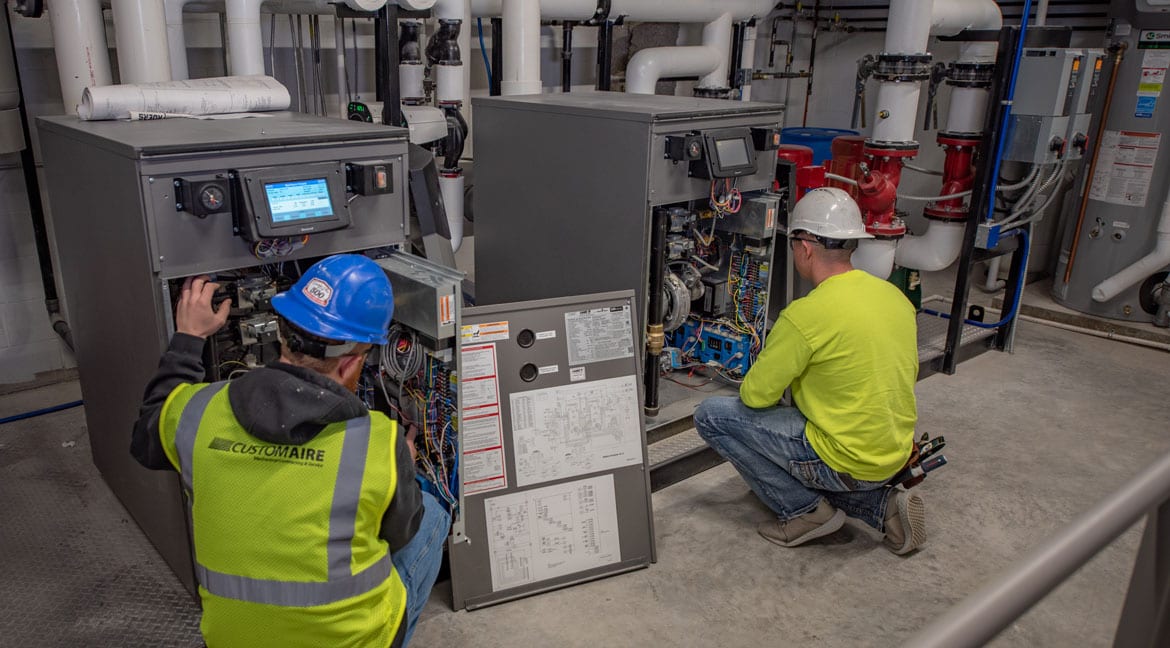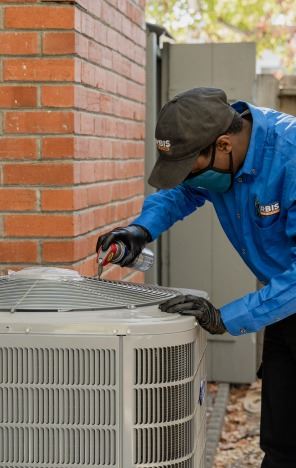Key Information Before Installing ductless mini splits
Key Information Before Installing ductless mini splits
Blog Article
Picking In Between a Warmth Pump and Heating System: Secret Considerations for Your A/c Needs
When assessing home heating alternatives for a/c needs, the choice in between a heat pump and a heater can be complicated. Each system provides distinct advantages tailored to specific environments and power performance objectives. Comprehending these differences is necessary for making an enlightened option. Secret factors such as installment expenses and ecological effect further make complex the selection procedure. Which choice truly straightens with one's comfort and sustainability choices? The following areas will check out these considerations carefully.
Understanding Warmth Pumps: Exactly How They Function and Their Benefits
While lots of property owners take into consideration different home heating options, recognizing how heatpump function and their benefits can greatly affect their choice. Heatpump run by moving heat instead of generating it. In the winter months, they draw out warm from the outside air or ground and move it indoors, while in the summer, they reverse this procedure, cooling down the home by eliminating warm outside. This twin capability makes them versatile for year-round environment control.One of the key advantages of heat pumps is their energy efficiency. They utilize significantly much less electrical energy contrasted to conventional heater, possibly resulting in lower utility expenses (heat pump replacement ooltewah tn). Additionally, warm pumps have a smaller carbon impact, making them an eco pleasant selection. They also require much less maintenance than conventional systems, adding to lasting expense financial savings. On the whole, recognizing the technicians and benefits of heatpump can aid home owners make educated choices concerning their heating and cooling demands
Exploring Furnaces: Types, Operation, and Benefits
Heating systems can be found in various types, including gas, electrical, and oil versions, each with unique operational mechanisms. Comprehending these distinctions is crucial, as they affect efficiency and home heating performance. In addition, heating systems provide various benefits, such as regular warm outcome and reliability in cooler climates.
Sorts of Furnaces
Home heating systems can vary considerably in layout and operation, with furnaces being a popular choice amongst home owners. There are numerous sorts of heating systems, each using different gas sources and innovations. Gas heating systems are typical, leveraging gas to produce warmth efficiently. Electric furnaces, on the other hand, use electric resistance to produce warmth, typically favored for their simple installation. Oil heaters, while less typical, work in locations with limited gas gain access to (furnace replacement). Additionally, condensing heating systems optimize energy effectiveness by reusing and recording exhaust gases. Each type operates via a system of heat exchangers and ductwork to distribute cozy air throughout a home. Understanding the distinctions between these heating system kinds is necessary for informed a/c choices
Benefits of Furnaces
For house owners looking for dependable warmth throughout cool months, the advantages of heating systems are considerable. Heaters provide constant heating, making sure also temperature levels throughout the home. They are particularly efficient in extreme cool, typically outperforming heatpump in cold conditions. Numerous types, consisting of gas, electric, and oil furnaces, use adaptability to meet diverse needs and preferences.Furnaces also tend to have lower preliminary setup expenses compared to heat pumps, making them a more available choice for numerous. Their robust design contributes to a longer life-span, with several devices lasting over 15 years with correct upkeep. In addition, modern-day heating systems are often equipped with advanced technology for boosted performance, which can cause minimized power expenses. Overall, furnaces continue to be a reputable selection for reliable home heating.

Power Performance: Comparing Warm Pumps and Furnaces
When comparing energy performance between heatpump and heaters, the Seasonal Energy Effectiveness Proportion (SEER) plays an important function in determining efficiency. Furthermore, an operational price analysis exposes the lasting financial implications of each system. Comprehending these aspects can guide property owners in making educated choices concerning their heating services.
Seasonal Energy Effectiveness Proportion
Power performance plays an important function in the decision-making process between warm pumps and heating systems, specifically when taking into consideration the Seasonal Power Performance Proportion (SEER) This statistics actions the cooling efficiency of heat pumps over an entire cooling season, providing a standardized way to evaluate performance. Higher SEER rankings suggest higher energy effectiveness, equating to lower power intake and lowered energy expenses. In contrast, heating systems are normally examined using the Yearly Fuel Utilization Efficiency (AFUE) rating, which reflects home heating effectiveness. When comparing these two systems, homeowners should focus on SEER scores for heatpump, as they directly influence general energy financial savings and ecological sustainability. A complete understanding of SEER can especially affect the long-lasting complete satisfaction and cost-effectiveness of the chosen cooling and heating option.
Operational Price Analysis
Understanding the functional expenses related to warm pumps and furnaces is essential for home owners examining their options. Warmth pumps normally provide greater power efficiency, transforming electric power into warm with marginal waste. This leads to reduced monthly energy costs, particularly in modest climates. Alternatively, traditional heaters, especially gas versions, might have lower ahead of time expenses yet can incur higher functional expenditures in time as a result of fuel costs and performance ratings.Moreover, warm pumps can operate as both heating and cooling down systems, possibly reducing the requirement for different heating and cooling systems. While first investments for heatpump might be greater, their long-term cost savings in energy performance can make them a more economical selection for many homes. Cautious analysis of regional energy prices is crucial to identify the most effective alternative.
Installment Prices: What to Anticipate for Each Heating Unit
Installment costs for heating unit can vary considerably between warm pumps and heaters, influencing home owners' choices. Heatpump generally have higher in advance setup costs, generally varying from $3,500 to $8,000, relying on the device dimension and complexity of installation. This includes the outdoor system, interior handling system, and essential ductwork alterations. Alternatively, heating systems tend to have lower initial costs, averaging in between $2,500 and $6,000, my site which can be appealing for budget-conscious home owners. Nonetheless, installment costs can boost if considerable ductwork is required.Moreover, the selection of fuel type for furnaces-- all-natural gas, lp, or electrical-- can likewise impact installation prices. While heatpump supply power efficiency, their initial financial investment may hinder some customers. Eventually, evaluating installment expenses along with long-lasting financial savings and effectiveness will help property owners in making informed choices about their furnace.
Climate Factors To Consider: Which System Carries Out Much Better in Your Area
Just how do climate problems affect the efficiency of heater? The performance of warm pumps and furnaces can differ significantly relying on the local environment. In modest climates, warmth pumps excel by efficiently moving heat from the outside air, making them an energy-saving alternative. Nevertheless, their performance decreases in exceptionally chilly temperatures, where they may struggle to remove enough warm. Alternatively, furnaces, especially gas designs, provide trusted and consistent warmth no matter of outdoor conditions, making them more effective in cooler regions.In locations that experience milder winters months, heatpump can operate efficiently year-round, supplying both home heating and air conditioning. In comparison, regions with rough winters months typically gain from the robustness of furnaces. Eventually, comprehending the regional climate is necessary when determining in between a warm pump and a furnace, as it directly influences their functional performance and general performance.
Upkeep Demands: Long-Term Care for Warmth Pumps vs. Furnaces
While both warm pumps and furnaces call for routine upkeep to ensure peak performance, their details requirements and care regimens differ substantially. Heating systems generally require less frequent interest, with annual assessments sufficing to look for gas leaks, tidy filters, and evaluate total performance. Their simpler style frequently permits for straightforward repairs.In comparison, heatpump demand biannual maintenance as a result of their twin duty in heating and cooling. This consists of cleansing coils, inspecting go right here cooling agent levels, and making sure that both the exterior and indoor systems operate at their ideal. Additionally, heatpump upkeep typically entails more complex parts, making professional maintenance essential.Neglecting upkeep can lead to reduced performance and enhanced energy prices for both systems. Inevitably, property owners need to consider these long-lasting treatment needs when picking between a heatpump and a heater, as aggressive upkeep can extend the lifespan and performance of either system significantly.
Ecological Influence: Picking a Lasting Home Heating Option
The environmental impact of heater is a vital analysis for homeowners seeking sustainable options. Heatpump are generally more energy-efficient than standard furnaces, as they move warmth as opposed to produce it, substantially lowering carbon emissions. By making use of renewable resource resources, such as geothermal or air-source heat pumps, home owners can better lessen their ecological footprint.On the various other hand, gas heating systems discharge greenhouse gases and add to air pollution, though they typically offer higher warmth result. Nevertheless, improvements in innovation have brought about the advancement of high-efficiency furnaces that decrease emissions.Ultimately, choosing a furnace entails evaluating effectiveness versus environmental impact. Home owners are motivated to mirror on neighborhood energy resources and motivations for sustainable systems, ensuring an option that aligns with both individual convenience and environmental duty. The decision affects not only instant convenience yet also lasting sustainability and environmental wellness.
Frequently Asked Concerns
The Length Of Time Do Warm Pumps and Furnaces Generally Last?
The life-span of heat pumps normally ranges from 15 to twenty years, while heaters can last Learn More between 15 to thirty years. Normal upkeep significantly influences their longevity and efficiency in supplying home heating solutions.
Can I Use a Warm Pump in Exceptionally Cold Climates?
Heatpump can operate in incredibly cool environments, yet their efficiency decreases as temperature levels decline. In such problems, supplementary heating sources may be necessary to keep comfortable interior temperatures and assure peak efficiency.

What Is the Noise Degree of Warm Pumps Versus Furnaces?
The noise degrees of heatpump and furnaces vary considerably. Typically, heatpump operate even more quietly than standard furnaces, making them preferable for those sensitive to seem, while heating systems may create louder operational sounds during heating cycles.
Are Warm Pumps Suitable for Both Home Heating and Cooling?
Heatpump are indeed ideal for both heating & cooling (furnace replacement). They function by transferring warm, providing effective temperature level control year-round, making them a versatile choice for home owners looking for an all-in-one cooling and heating service
What Size Heating Unit Do I Need for My Home?
Establishing the ideal dimension furnace for a home needs examining variables such as square video, insulation quality, local climate, and the home's design. Consulting an expert can ensure an exact evaluation and excellent comfort. Warm pumps generally provide greater energy effectiveness, transforming electric power into warmth with marginal waste. In modest climates, heat pumps excel by effectively moving heat from the outside air, making them an energy-saving alternative. Conversely, heaters, particularly gas models, supply reputable and constant heat regardless of outside conditions, making them preferable in cooler regions.In locations that experience milder winters, heat pumps can operate efficiently year-round, supplying both home heating and air conditioning. Warmth pumps are typically a lot more energy-efficient than traditional heaters, as they move heat instead than create it, substantially reducing carbon discharges. By using sustainable power resources, such as air-source or geothermal heat pumps, house owners can additionally decrease their ecological footprint.On the various other hand, natural gas heaters send out greenhouse gases and contribute to air pollution, though they frequently offer higher warmth result.
Report this page